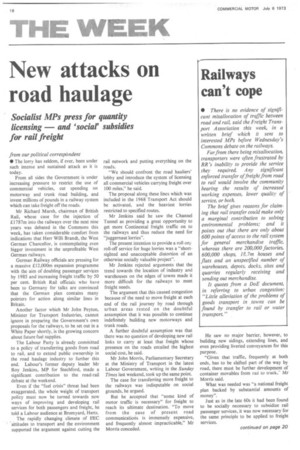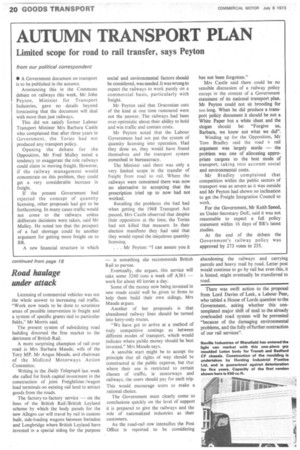New attacks on road haulage
Page 20

Page 22

If you've noticed an error in this article please click here to report it so we can fix it.
Socialist MPs press for quantity licensing — and 'social' subsidies for rail freight
from our political correspondent
• The lorry has seldom, if ever, been under such intense and sustained attack as it is today.
From all sides the Government is under increasing pressure to restrict the use of commercial vehicles, cut spending on motorway and trunk toad building, and invest millions of pounds in a railway system which can take freight off the roads.
Mr Richard Marsh, chairman of British Rail, whose case for the injection of £1787m into the railways over the next nine years was debated in the Commons this week, has taken considerable comfort from indications that Herr Willi Brandt, the West German Chancellor, is contemplating even bigger investment in the unprofitable West German railways.
German Railway officials are pressing for a massive £12,000m expansion programme with the aim of doubling passenger services by 1985 and increasing freight traffic by 50 per cent. British Rail officials who have been to Germany for talks are convinced that the German plan contains many pointers for action along similar lines in Britain.
Another factor which Mr John Peyton, Minister for Transport Industries, cannot ignore in preparing the Government's own proposals for the railways, to be set out in a White Paper shortly, is the growing concern about future fuel supplies.
The Labour Party is already committed to a policy of transferring goods from road to rail, and to extend public ownership in the road haulage industry to further this end. Labour's former deputy leader Mr Roy Jenkins, MP for Stechford, made a significant contribution to the road-rail debate at the weekend.
Even if the "fuel crisis" threat had been exaggerated, the whole weight of transport policy must now be turned towards new ways of improving and developing rail services for both passengers and freight, he told a Labour audience at Brom yard, Herts.
The rapidly changing climate of EEC attitudes to transport and the environment supported the argument against cutting the rail network and putting everything on the roads.
"We should confront the road hauliers' lobby and introduce the system of licensing all commercial vehicles carrying freight over 100 miles," he said.
The proposal along these lines which was included in the 1968 Transport Act should be activated, and the heaviest lorries restricted to specified routes.
Mr Jenkins said he saw the Channel Tunnel as providing a great opportunity to get more Continental freight traffic on to the railways and thus reduce the need for "juggernaut lorries".
The present intention to provide a roll-on/ roll-off service for huge lorries was a "shortsighted and unacceptable distortion of an otherwise socially valuable project".
Mr Jenkins rejected arguments that the trend towards the location of industry and warehouses on the edges of towns made it more difficult for the railways to meet freight needs.
The argument that this caused congestion because of the need to move freight at each end of the rail journey by road through urban areas rested on the doubtful assumption that it was possible to continue indefinitely building new motorways and trunk roads.
A further doubtful assumption was that there was no question of developing new rail links to carry at least that freight whose presence on the roads entailed the highest social cost, he said.
Mr John Morris, Parliamentary Secretary at the Ministry of Transport in the latest Labour Government, writing in the Sunday Times last weekend, took up the same point.
The case for transferring more freight to the railways was indisputable on social grounds, he argued.
But he accepted that "some kind of motor traffic is necessary" for freight to reach its ultimate destination. "To move from the ease of present road communications is immensely expensive, and frequently almost impracticable," Mr Morris conceded. He saw no major barrier, however, to building new sidings, extending lines, and even providing liveried conveyances for this purpose.
"Given that traffic, frequently at both ends, has to be shifted part of the way by road, there must be further development of container movables from rail to truck," Mr Morris said.
What was needed was "a national freight plan backed by substantial amounts of money".
Just as in the late 60s it had been found to be socially necessary to subsidize rail passenger services, it was now necessary for the same principle to be applied to freight services. Licensing of commercial vehicles was not the whole answer to increasing rail traffic. "Work now needs to be done to scrutinize areas of possible intervention in freight and a system of specific grants tied to particular fields," Mr Morris said.
The present system of subsidizing road building distorted the free market to the detriment of British Rail.
A more surprising champion of rail over road is Mrs Barbara Maude, wife of the Tory MP, Mr Angus Maude, and chairman of the Midland Motorways Action Committee.
Writing in the Daily Telegraph last week she called for fresh capital investment in the construction of joint Freightliner /wagon load terminals on existing rail land to attract goods from the roads.
The factory-to-factory service — on the lines of the British Rail /British Leyland scheme by which the body panels for the new Allegro car will travel by rail in custom built, side-loading wagons between Swindon and Longbridge where British Leyland have invested in a special siding for the purpose — is something she recommends British Rail to pursue.
Eventually, she argues, this service will take some 3240 tons a week off A361 — work for about 40 lorries a day.
Some of the money now being invested in new roads could well be given to firms to help them build their own sidings, Mrs Maude argues.
Another of her proposals is that abandoned railway lines should be turned into lorry-only routes.
"We have got to arrive at a method of truly competitive costings as between different modes of transport, which would indicate where public money should be best invested," Mrs Maude says.
A sensible start might be to accept the principle that all rights of way should be constructed at the public expense, but that where their use is restricted to certain classes of traffic, ie motorways and railways, the users should pay for each trip. This would encourage users to make a rational choice.
The Government must clearly come to conclusions quickly on the level of support it is prepared to give the railways and the role of nationalized industries as their customers.
As the road-rail row intensifies the Post Office is reported to be considering abandoning the railways and carrying parcels and heavy mail by road. Letter post would continue to go by rail but even this, it is hinted, might eventually be transferred to road.
There was swift action to the proposal from Lord Davies of Leek, a Labour Peer, who tabled a House of Lords question to the Government, asking whether this contemplated major shift of mail to the already overloaded road system will be prevented "because of the damaging environmental problems, and the folly of further contraction of our rail services".
Neville Industries of Mansfield has entered the light van market with this one-piece grp moulded Luton body for Transit and Bedford CF chassis. Construction of the moulding is undertaken by Hunting Industrial Plastics Ltd, and is guaranteed against deterioration for five years. Capacity of the first version shown here is 550 cu ft.




























































































































































